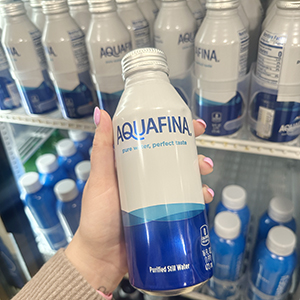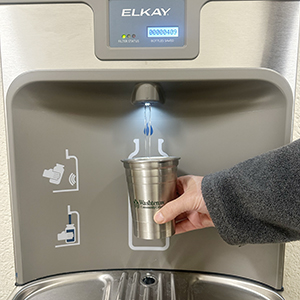In a significant move to expand its sustainability initiatives, Washtenaw Community College announced it has eliminated the sale of single-use plastic water bottles from on-campus retail outlets and vending machines effective April 1, 2025.
 WCC vendors Creative Dining and Barnes & Noble have agreed to replace plastic bottles
with more environmentally friendly aluminum and cardboard alternatives at the college’s
coffee shop, cafeteria, micro market and bookstore. Continental Canteen, which services
vending machines on campus, has also made the transition to canned or boxed water.
WCC vendors Creative Dining and Barnes & Noble have agreed to replace plastic bottles
with more environmentally friendly aluminum and cardboard alternatives at the college’s
coffee shop, cafeteria, micro market and bookstore. Continental Canteen, which services
vending machines on campus, has also made the transition to canned or boxed water.
Dr. Emily Thompson, a Life Sciences faculty member and faculty lead of the college’s Center for Sustainability and Resilience, says the sale of water in plastic bottles “has long been an issue that concerns students.” She noted an awareness campaign the WCC Students for Sustainability Club launched in 2017, pointing out water sold in plastic bottles is not healthy for the environment or people consuming them.
“Club members stressed at that time that if you can get water free from a water fountain, why pay money to get it in a form that creates chemical pollution where it’s made, and plastic waste when you throw it away?” Thompson recalled. “Additionally, some chemicals in plastic linked to cancer and poor health can leach into the water you’re drinking.”
Aluminum and cardboard can be infinitely recyclable and renewable, whereas plastic is not. Most plastics can only be recycled a few times before its quality degrades. Aluminum can be recycled over and over without losing quality. Cardboard, made from a renewable resource, can be recycled multiple times before the fibers break down too much for further use. It can also decompose naturally, unlike plastic.
Any aluminum and cardboard water container purchased on campus will be recycled when placed in the college’s green recycling bins labeled with “Bottles, Cans and Containers.”
 Of course, using refillable water bottles is the best choice for the environment.
To encourage their use by students and employees, WCC is transitioning all of the
drinking fountains on campus to state-of-the-art refrigerated and filtered bottle
filling stations. During the college’s winter break in March, all the drinking fountains
in the Student Center were converted.
Of course, using refillable water bottles is the best choice for the environment.
To encourage their use by students and employees, WCC is transitioning all of the
drinking fountains on campus to state-of-the-art refrigerated and filtered bottle
filling stations. During the college’s winter break in March, all the drinking fountains
in the Student Center were converted.
Bottle filling stations were previously added in the Business Education Building, Crane Liberal Arts & Science Building, Technical & Industrial Building and Gunder Myran Building. The target for completing the remainder of WCC campus buildings is the end of 2025. Their primary purpose is to significantly reduce the environmental impact caused by single-use containers while ensuring convenient access to cold and clean drinking water. Many of the refill stations include a paper cup dispenser for those without a reusable water bottle.
WCC Resource Recovery Manager Becky Andrews says the Recycling Operations Department already noted a 4.5% decrease in the amount of single-use plastic bottles being recycled on campus in 2024, potentially due to the installation of the filtered water refill stations.
“The switch now to boxed and canned water will further reduce the quantity of single-use plastic on campus, as well as addressing the associated issues such as plastics in the environment and the existence of microplastics, tiny plastic particles that pose environmental and health issues due to their accumulation in ecosystems,” Andrews said.
The environmental benefits of these initiatives are substantial. Single-use plastic bottles contribute significantly to global plastic waste, with estimates indicating that less than 9% of the 8.3 billion tons of plastic produced since the 1950s has been recycled, with the remaining 6.3 billion tons persisting in landfills, the environment, oceans and other bodies of water. Aluminum bottles and cartons offer more sustainable packaging options, with aluminum cans having a recycling rate of up to 65%, making them the most recycled beverage container globally.
Tags: Campus News, Recycling, Sustainability
